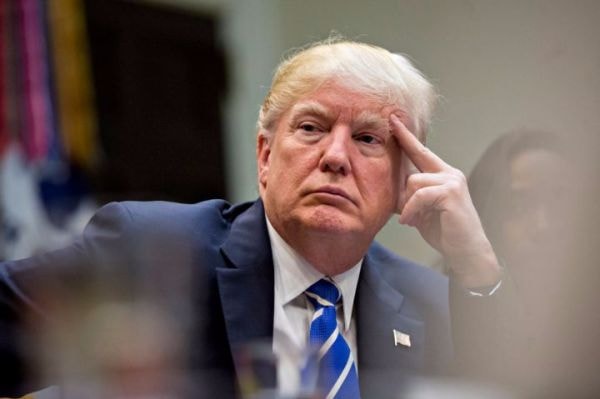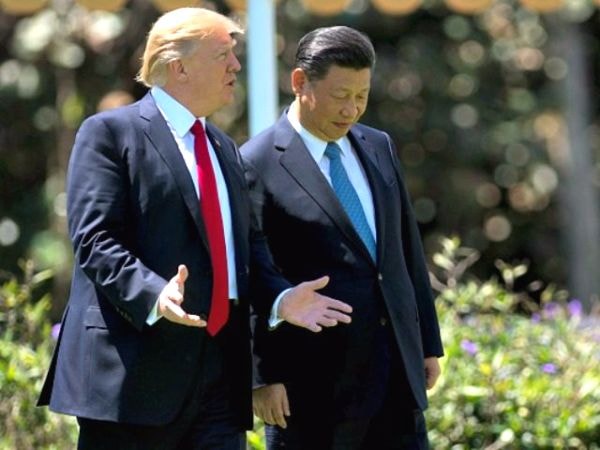Temporary or strategic?
(Baonghean) - In complete contrast to his campaign promises, US President Donald Trump has decided not to label China a currency manipulator. The “reversal” in policy decisions is not unusual for this president with many differences, but Mr. Trump’s new decision has inevitably raised public skepticism.
A bargain
In a recent interview with AP, US President Trump affirmed that he would not put China on the list of currency manipulators. And this is an example of “flexibility”. Previously, China was accused by the US of “putting pressure” on the Yuan to help Chinese exports compete with US goods. Before being elected, Mr. Donald Trump compared this behavior of China to “crush” US goods, and pledged to put China on the list of “currency manipulators” on the first day of his inauguration as US President. But since meeting with Chinese President Xi Jinping, Mr. Trump’s views on Beijing’s currency have changed 180 degrees.
 |
| President Donald Trump drops accusations of China manipulating its currency. Getty Image |
Explaining his decision, the White House owner wrote in a tweet: “Why do that when China is helping us solve the North Korea problem?” Trump’s explanation left economists “shocked” because the two issues are almost unrelated. It seems that President Trump used the label “currency manipulation” to “bargain” for an important political issue that the United States is facing, not whether the country is actually manipulating its currency or not.
It should be noted that the US Treasury Department is using three main criteria to determine currency manipulation, which were introduced by the Obama administration last year: a bilateral trade surplus with the US of $20 billion or more, a global current account surplus of more than 3% of gross domestic product (GDP), and foreign exchange purchases maintained at 2% of GDP over 12 months. According to the US, China currently violates one of the three criteria for currency manipulation, which is China's bilateral trade surplus with the US of up to $347 billion in 2016.
President Trump’s statements have made many people wonder whether, if China does not “join hands” with the US to solve the North Korea issue, Trump will disregard the above criteria to list China as a currency manipulator. Observers say that if he wants, the billionaire President is willing to draft a new set of criteria so that “label” can be used.
Strategic card?
Observers say that President Trump’s decision not to label China a currency manipulator, despite his pledge during the election campaign, was a wise and calculated decision. In addition to pressuring China to deal with the North Korea issue, Trump must certainly consider the benefits to the US economy when competing with China. That’s why he frankly reminded Beijing to open its market and economy to US companies as a measure to adjust the bilateral trade balance.
 |
| Mr. Trump's views on China's currency changed when he met President Xi Jinping in early April 2017. Photo AFP. |
In addition, China will also have to promote market participation in determining the yuan exchange rate. If these requests from the US are implemented by China, it can be seen as a certain victory for President Donald Trump, who has at the same time forced Beijing to make concessions on many issues that have been a sticking point in the trade relationship between the two countries for many years. The success in using the “currency manipulation” card with China is opening up the prospect that the US government will also achieve similar success with the remaining major trading partners on its blacklist.
In addition, the fact that the US has not put China on the list of currency manipulators has eased the risk of a trade war between the two countries. If implemented as promised during the election, imposing tough sanctions on China could also be detrimental to the US. Because most of the most populous US states such as Washington, Louisiana, California, New York, Illinois... are still benefiting from maintaining the current trade relationship between the US and China. On the other hand, states such as South Carolina, West Virginia or Montana, which are in a state of large trade surplus with China, will face unpredictable consequences if a trade war occurs between the two sides.
After all, Mr. Trump used a series of bold statements, including the issue of China's currency, only to "make an impression" during the election campaign, but the realization of those statements is another matter. Regarding the issue of trade cooperation with China, some experts believe that although it is true that China has managed the yuan unreasonably and manipulated this currency since 2005, the US administrations since then have not taken any tough measures against Beijing.
So, unless there are really special reasons, few US leaders choose this undesirable option because the consequences will affect both sides. Over the past 20 years, the US Treasury has only accused China of currency manipulation once, in 1994. So it can be said that the accusations related to this issue so far have been more diplomatic than economic.
Thanh Huyen
| RELATED NEWS |
|---|
